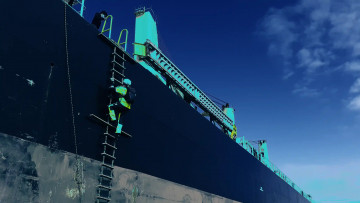Furuno Finland Building the Technical Foundation for a New Era of Navigation
The Remote Pilotage MVP project (Minimum Viable Product) is coordinated by Novia and aims to advance the development of remote pilotage. The project has attracted international interest and has developed and tested solutions that could enable pilotage to be conducted remotely in the future.
Secure Connection to Pilots’ Remote Workstations
One of the key technical implementers is Furuno Finland, responsible for creating an operational environment where ship navigation systems, such as radar and the Electronic Chart Display and Information System (ECDIS), can be integrated with pilots’ remote workstations.
“We have built a system in which radar and sensor data is securely transferred from the ship to a Remote Operation Center, where pilots have dedicated workstations,” explains Development Manager Juhani Laukkanen, who oversees the project’s technical implementation.
Standard Devices, Individual Challenges
The project utilized standardized equipment but integrating it with systems from various manufacturers and ensuring that the data functions seamlessly in a remote environment has required extensive development work. The project has also explored GNSS-independent positioning by aligning radar and chart data and developed interference monitoring as a contingency for satellite navigation disruptions.
GNSS (Global Navigation Satellite System) is an umbrella term referring to all global satellite navigation systems.
A Service, Not Just Technology – Pilots Involved in Development
Pilots have played a central role in the development process.
“They have brought concrete requirements and ideas to the table, and we’ve been able to develop functional solutions based on those,” Laukkanen notes.
Furuno’s Quality and Safety Manager Olli Seppälä emphasizes the service-oriented nature of the project.
“This is not just about building a technical device, but a service that enables professionals to do their jobs in a new way. The work of pilots is shifting from on-site to remote control, which requires a completely new set of tools.”
Collaboration with Novia’s researchers has brought new perspectives and expertise to the project.
“Working with universities always brings fresh ideas and opens doors to future projects,” Seppälä adds.
Furuno’s involvement in the MVP project concluded at the end of June 2025, but according to Laukkanen, testing may continue in the autumn if needed, and further projects are already underway. The achievements of the project have potential for broader application, for example in other remote-controlled maritime traffic systems.
“Our goal has been to create a solution that can be replicated across different ships and systems. I believe remote pilotage will gradually become more widespread, in Finland and beyond,” Laukkanen summarizes.
About Furuno Finland
Furuno Finland Oy is a subsidiary of the Japanese Furuno Electric Co., Ltd. The company was established in Finland in 2002 and is headquartered in Espoo.
It imports, sells, installs, and maintains a wide range of marine electronics in Finland, including navigation and communication equipment as well as fish-finding systems, serving both domestic and international clients.
Furuno Finland is particularly known as a supplier of advanced bridge system solutions. It has been involved in the development of some of the first type-approved ECDIS devices and centralized alarm systems (e.g., BR 2500).
The company’s Espoo office also houses an R&D unit that develops chart and radar software for integrated bridges in cooperation with the parent company.
Furuno Finland has approximately 50 employees and offers training, maintenance and installation services, as well as comprehensive turnkey solutions for maritime and surveillance needs.
Photo: Finnpilot
